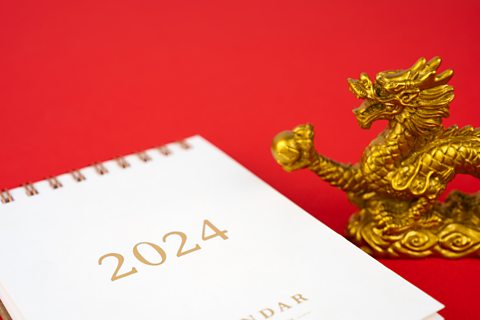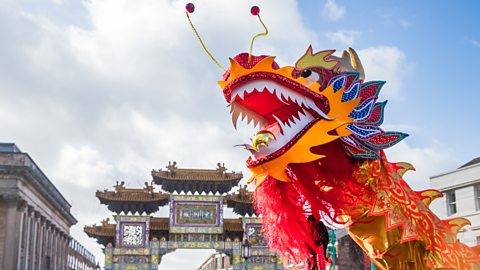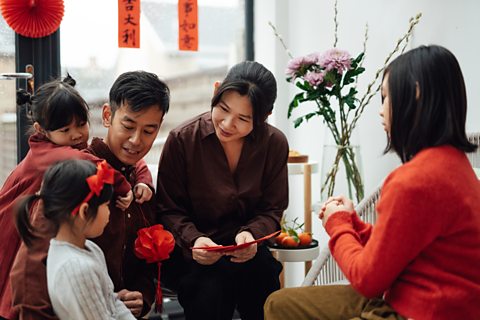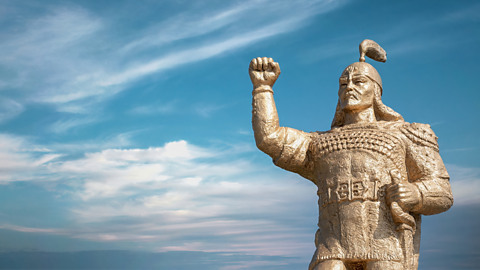The Lunar New Year or Spring Festival is celebrated across the world and particularly throughout East Asia and China, where itˇŻs one of the most important holidays in the calendar.
ItˇŻs a time when friends, families and loved ones get together ¨C and similarly to the Gregorian New Year, itˇŻs an opportunity to set goals and resolutions for what you want to achieve in the coming year.
±«Óătv Bitesize spoke to Dr Zhaokun Xin, a lecturer in Chinese studies, and Hongjun Ma, a senior language tutor in Chinese studies, both from the University of Manchester, to discuss the significance of the Year of the Dragon and ways people around the world will be celebrating.
When is the Lunar New Year?
In 2024, the Lunar New Year starts on Saturday 10 February. Dr Xin explains that this has to do with the traditional agricultural calendar, in which the arrival of a new moon signifies the start of a new month.

The date of the Lunar New Year falls sometime between 21 January and 20 February, on the second new moon after the December solstice. The calendar follows a 60 year cycle, where each year is said to be guarded by one of the 60 Gods of Tai Sui.
Why are there different animals that represent each year?
Each year in the Chinese calendar is represented by one of the 12 animals of the zodiac: Rat, Ox, Tiger, Rabbit, Dragon, Snake, Horse, Goat, Monkey, Rooster, Dog, and Pig.
According to the traditional legend of The Great Race as Hongjun Ma tells us, the Jade Emperor wanted to select 12 animals to be his guards. The faster they reached HeavenˇŻs gates the higher they would rank in the running order of the years.
What is the significance of the dragon?
2024 is the Year of the Dragon, the only mythical creature among the zodiac animals. Its image has been built through elements of other animals, such as having the body of a snake and the scales of a fish.
The dragon is an auspicious being in Chinese culture, and it features prominently in literature and media in the country. Chinese people have traditionally considered themselves to be descendants of the dragon and it is therefore much more respected that the fire-breathing villain of Western fairy tales. Instead, they are considered to be powerful creatures that are "believed to have control of the seas and water," says Dr Xin.

"The dragon is particularly significant at this time of year as it is commonly associated with springtime," Dr Xin continues. The guardian spirit of the Eastern direction, the dragon looks towards the rising sun and the new year.
What does it mean for people to be born in the year of the dragon?
As the dragon is such an important creature in Chinese culture, the Year of the Dragon is regarded as being very special. Those born in the Year of the Dragon are expected to be strong, successful, and leaders.
Hongjun Ma shares the Chinese proverb, ˇ®w¨¤ng z¨« ch¨¦ng long (Íű×ÓłÉÁú)¨C which means that parents wish for their children to become dragons one day ¨C showing that this creature is admired for its success. ItˇŻs believed that the riches are not only for those who are born in the Year of the Dragon but something that all people can benefit from throughout the year.
How do people celebrate?
From calligraphy competitions to cutting your hair, there are many different ways that people celebrate the Spring Festival. Hongjun Ma speaks of the CCTV Spring Festival Gala, which is an entertainment programme broadcast from mainland China and the countryˇŻs biggest Lunar New Year TV show.
A common communal activity to bring in the New Year is to make dumplings together. Their shape is said to echo the roundness of coin purses and represents wealth.
The dragon is a symbol of good fortune and people will watch and take part in dragon dances and processions. Another way to nurture luck and positive energy is to place characters outside your door such as the character for fortune - which is placed upside down to mean ˇ®fortune has arrived.ˇŻ Traditionally, Dr Xin says, "older generations gift money to younger relatives in red envelopes to grant prosperity for the coming year."

Gathering together with family and friends is an important part of celebrating the Spring Festival and many people travel far to return home. However, some people are engaging in the new practice of going on holiday to celebrate. While traditionally the holiday would be celebrated at home, younger people may choose to go out for a meal, especially if they are living far from mainland China.
This article was published in 2024
Are these history's longest works of art?
From paintings that span miles, to million-word novels, ±«Óătv Bitesize takes a look at a selection of historyˇŻs longest works of art.

How are birthdays celebrated across the world?
From celebratory songs to delectable sweet treats, ±«Óătv Bitesize takes a look at some of the ways birthdays are celebrated across the world.

How does school differ around the world?
From uniforms to school dinners, ±«Óătv Bitesize takes a look at some of the surprising ways that schools differ across the globe.
